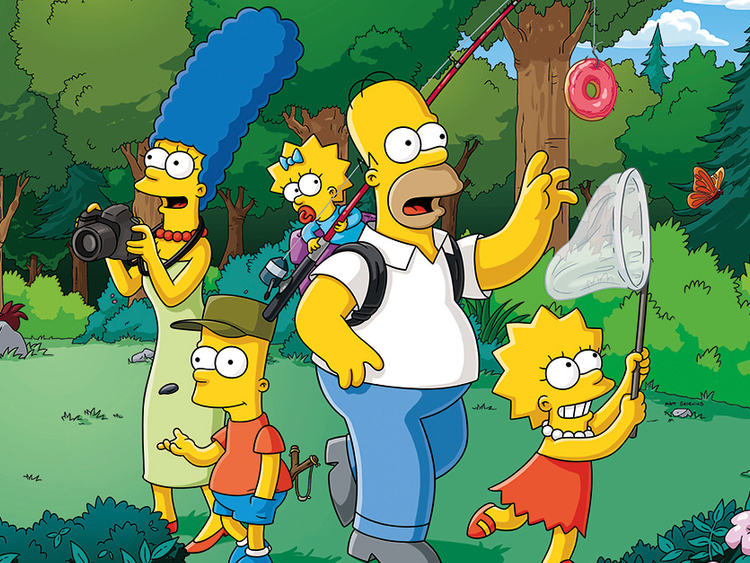
When four-time Emmy-winning writer and producer Mike Reiss started out as one of the first members of the original writing staff of The Simpsons in 1989, he wasn’t particularly interested in political comedy. “That’s changed now. I’m much more interested in it now,” he says with a shrug that concedes we live in odd times.
Reiss, who still works on The Simpsons one day a week — “because that’s all I feel I’m good for” — is currently in Doha as part of the Qumra 2017 film event, and will take centre stage on Monday afternoon to discuss Writing and Production Animation. He talks to Gulf News tabloid! about satire in the current moment, his nearly three-decade association with one of the world’s most beloved TV shows and the joy of writing for TV versus the complexity of writing for film.
The current political landscape in the United States feels strange — to put it mildly. What sort of impact is it going to have on The Simpsons and does it lend itself useful to comedy writing? [The Simpsons famously aired Bart to the Future in 2000, in which a grown-up Lisa proud to be America’s first female president inherits disasters from a Donald Trump presidency].
It does and you know everybody thinks ‘Oh this is great for The Simpsons’ but The Simpsons is never topical. It’s never a timely show because it takes us a year to make an episode; so Donald Trump is doing all this crazy stuff, but if we put it on The Simpsons, we have a hope that by the time the show would air, he wouldn’t be president anymore [laughs].
It feels like there’s a lot more raw material out there for writers to work with than when you started out. What’s your take on that and how have you changed since you started out as a writer in the early 1980s?
I’m much more interested in political comedy now than I was at other times. I started watching The Daily Show again and Saturday Night Live and the late night talk shows in America, because yes, they have so much more to work with and because I feel like they’re doing a little good. It’s not just jokes about the president, but it’s jokes about how crazy it is and sort of shining a spotlight on just how surreal politics has become.
Politics on both sides?
No, it’s the party in power... the one that really drives me crazy.
Can comedy or satire serve a therapeutic purpose to alleviate the despair that some feel with the current state of the world?
I don’t know. The easy answer would be yes. I don’t know. But the realisation of Donald Trump becoming president was the fact that people like me working in satire or political comedy have no real effect. That was it. The whole of American show business was focused on making fun of Donald Trump and shining a spotlight on how ridiculous he was and yet he won. The day he won I realised we are completely irrelevant.
What would you say to the notion that there’s an increasing trend of snubbing intellectual curiosity and intelligent discourse — a battle between ‘the elite’ and ‘the rest’? Is this trend on the rise?
Yes. Again many of my friends and I work in Hollywood and everyone’s so liberal and we forget who conservatives are until the election. It was just such a wake-up call for me that not everyone thinks like us. That not everyone reads the papers in the same way we do. The elite is hated and perceived as elite. We don’t think of ourselves as elite but that’s how they look at us.
Is there an antidote?
No [laughs]... No easy answers on this topic. I will tell you a funny story on this. I was invited to be on a panel on political satire and they flew me and several other writers — from The Daily Show, from The New Yorker — to Chicago for a panel and the first question was: ‘Can satire change politics?’ and they went down the line and we all just said ‘no, no, no, no and no’ and that was pretty much the end of the panel. The moderator had nowhere to go from there and we had all realised that we don’t really make a difference.
And yet, satire through The Simpsons has clearly withstood the test of time? What is it about the show that makes it so enduring and endearing? How much longer do you think it can keep going?
What’s more impressive to me is not that it’s stood the test of time. It’s that it’s stood the test of space. In other words, I’m here in Qatar and a year ago I was in India speaking about The Simpsons. I was recently in Malaysia, where someone told me Homer Simpson is a very Malaysian father. This is mind-blowing to all of us who work on the show. We don’t think outside the little room we work in. We don’t think about the world outside and we are shocked by what the world is getting out of it — and how people are relating to it.
I finally figured out why it stood the test of time. It’s a prosaic answer. The only reason a TV show, a hit show goes off the air is because the actors get bored and get tired of doing it. Cartoons on the other hand can go on forever. Our actors don’t get tired. They only work an hour or two hours a week and the writers love doing it. We love doing our job. It hit me [that] that’s the answer when I saw South Park has been on for 20 years. Family Guy has been on for 15 years. Mickey Mouse is 80-years-old and he’s not even good [laughs].
How does the one day a week on The Simpsons work for you?
Since the show has run for so long, everyone determines how much fresh material they have for the show. About half the staff does not put in a five-day week. I’ve been through 29 years, so one day a week is all I feel I’m good for and I like that.
You’ve also worked on the screenplays of animated films such as Ice Age: Dawn of the Dinosaurs. Is it vastly different to be a writer on a film when you have a formidable television background?
I’ve enjoyed it and I haven’t. I’ve worked on about 24 animation movies and only really liked four of them when they came out. They’re hugely different in that when you do a movie there are many writers working independently sending material to the studio.
In The Simpsons, if something doesn’t work, we change it. We cannot get a bad joke out fast enough. And we’re always eager to fix it.
In animation films there’s huge inertia about changing a bad script and I think a joke has to be really terrible and someone has to come in with a really great joke to replace it or they just leave it. That’s what’s made that work kind of frustrating.
I don’t do as many movies because I’m a little too candid. The line I use with them is: You don’t have to use my jokes but you have to use somebody’s.













